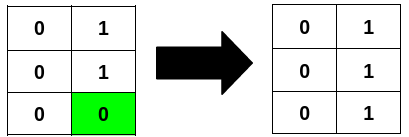Welcome to Subscribe On Youtube
3239. Minimum Number of Flips to Make Binary Grid Palindromic I
Description
You are given an m x n binary matrix grid.
A row or column is considered palindromic if its values read the same forward and backward.
You can flip any number of cells in grid from 0 to 1, or from 1 to 0.
Return the minimum number of cells that need to be flipped to make either all rows palindromic or all columns palindromic.
Example 1:
Input: grid = [[1,0,0],[0,0,0],[0,0,1]]
Output: 2
Explanation:

Flipping the highlighted cells makes all the rows palindromic.
Example 2:
Input: grid = [[0,1],[0,1],[0,0]]
Output: 1
Explanation:

Flipping the highlighted cell makes all the columns palindromic.
Example 3:
Input: grid = [[1],[0]]
Output: 0
Explanation:
All rows are already palindromic.
Constraints:
m == grid.lengthn == grid[i].length1 <= m * n <= 2 * 1050 <= grid[i][j] <= 1
Solutions
Solution 1: Counting
We separately count the number of flips for rows and columns, denoted as $\textit{cnt1}$ and $\textit{cnt2}$, respectively. Finally, we take the minimum of the two.
The time complexity is $O(m \times n)$, where $m$ and $n$ are the number of rows and columns of the matrix $\textit{grid}$, respectively.
-
class Solution { public int minFlips(int[][] grid) { int m = grid.length, n = grid[0].length; int cnt1 = 0, cnt2 = 0; for (var row : grid) { for (int j = 0; j < n / 2; ++j) { if (row[j] != row[n - j - 1]) { ++cnt1; } } } for (int j = 0; j < n; ++j) { for (int i = 0; i < m / 2; ++i) { if (grid[i][j] != grid[m - i - 1][j]) { ++cnt2; } } } return Math.min(cnt1, cnt2); } } -
class Solution { public: int minFlips(vector<vector<int>>& grid) { int m = grid.size(), n = grid[0].size(); int cnt1 = 0, cnt2 = 0; for (const auto& row : grid) { for (int j = 0; j < n / 2; ++j) { if (row[j] != row[n - j - 1]) { ++cnt1; } } } for (int j = 0; j < n; ++j) { for (int i = 0; i < m / 2; ++i) { if (grid[i][j] != grid[m - i - 1][j]) { ++cnt2; } } } return min(cnt1, cnt2); } }; -
class Solution: def minFlips(self, grid: List[List[int]]) -> int: m, n = len(grid), len(grid[0]) cnt1 = cnt2 = 0 for row in grid: for j in range(n // 2): if row[j] != row[n - j - 1]: cnt1 += 1 for j in range(n): for i in range(m // 2): if grid[i][j] != grid[m - i - 1][j]: cnt2 += 1 return min(cnt1, cnt2) -
func minFlips(grid [][]int) int { m, n := len(grid), len(grid[0]) cnt1, cnt2 := 0, 0 for _, row := range grid { for j := 0; j < n/2; j++ { if row[j] != row[n-j-1] { cnt1++ } } } for j := 0; j < n; j++ { for i := 0; i < m/2; i++ { if grid[i][j] != grid[m-i-1][j] { cnt2++ } } } return min(cnt1, cnt2) } -
function minFlips(grid: number[][]): number { const [m, n] = [grid.length, grid[0].length]; let [cnt1, cnt2] = [0, 0]; for (const row of grid) { for (let j = 0; j < n / 2; ++j) { if (row[j] !== row[n - 1 - j]) { ++cnt1; } } } for (let j = 0; j < n; ++j) { for (let i = 0; i < m / 2; ++i) { if (grid[i][j] !== grid[m - 1 - i][j]) { ++cnt2; } } } return Math.min(cnt1, cnt2); }